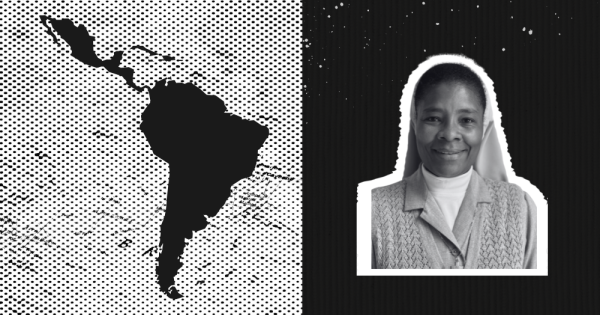Embracing Identity: Sr. Blanca Meza’s Journey as an Afro-Colombian Religious Woman
To the rhythmic pulse of a drum and the softness of her voice, Sr. Blanca Meza conveyed the rich tapestry of Afro-Colombian culture at the V Latin American and Caribbean Congress on Religious Life. Her performance was not just a song but a heartfelt declaration of identity, social justice, and the enduring spirit of her people—a call to equality and brotherhood.
Afro-Colombian Identity and Community
Sr. Meza opened her presentation with a profound line: “We are Afro-Colombians; we have an identity.” Her experience embodies the complex history of Afro-descendants in Latin America, particularly those whose ancestors were forcibly taken from Africa and endured the horrors of slavery. She emphasized their vibrant cultural identity and commitment to social justice, reflecting a collective history entwined with pain yet infused with hope.
The Legacy of Slavery and Resistance
Reflecting on the harrowing journey of her ancestors, Meza recounted that between the 16th and 19th centuries, approximately 12 million Africans were transported to the Americas as slaves. This grueling experience for her forebears shaped not only their survival but also their spirituality. Despite being stripped of their original beliefs upon arrival, many African Americans found solace and strength in their faith, particularly within the Catholic Church. Meza poignantly described this struggle as one that continues to reverberate within African American Catholic communities today.
A Call for Inclusivity
At the core of Meza’s message is a longing for an inclusive Church—one that embraces all members of the community regardless of race or historical injustices. “In our church and in our religious communities, we hope that the cry of our people will be heard spiritually,” she stated, emphasizing the need for recognition and acceptance. Historically, Afro-descendants faced exclusion from religious vocations, leading to a lack of representation that she finds troubling.
The Role of the Church in Creating Hope
During a panel discussion, Meza articulated a vision for the Church as a “sentinel of hope.” She believes the Church must open its doors wider to embrace those it has historically shunned. “Listening to us is vital,” she stressed. By fostering an environment where diverse voices can be heard without judgment, the Church can truly embody its mission of love and inclusivity.
Personal Experiences in the Community
Meza’s personal narrative sheds light on both the challenges and joys of her vocation as a Black woman in religious life. Entering a convent where she was often the only Black member presented hurdles that many might find daunting. Yet she discovered that her vibrant spirit and enthusiastic approach to life helped dissolve those barriers. “I transformed that heaviness into joy,” she reflected, ultimately feeling loved and accepted by her companions.
Addressing Racism Within Religious Communities
Despite her positive outlook, Meza acknowledges that discussions about race often evoke discomfort. She notes that the prevailing narratives in many religious congregations have historically marginalized Black voices. The terms she hears, such as “the congregation is going to ‘be blackened,’” highlight deep-seated prejudices that need to be confronted. Meza’s advocacy for inclusivity serves as both a challenge and an invitation for reflection within religious communities.
Hope for Future Generations
Meza passionately encourages young people, particularly those of African descent, to pursue their calling without fear. “Don’t be afraid, take risks,” she advises. Her own journey, full of introspection and transformation, serves as a beacon of hope. She implores newcomers to the faith to embrace their uniqueness and contribute to a broader understanding of religious life that acknowledges and celebrates diversity.
Progress and Challenges
While acknowledging the strides that have been made, Meza remains vigilant about the work that still lies ahead. She highlights the necessity of ongoing dialogue within congregations to ensure that historically marginalized groups are not only included but seen as integral participants in the fabric of religious life. Her belief in mutual support and collaboration resonates in her vision for what religious life should be—a vibrant community of diverse voices and stories, united in purpose.
By sharing her powerful narrative, Sr. Blanca Meza invites us to reflect on the complexities of identity, faith, and the shared responsibility of fostering a truly inclusive religious community.



